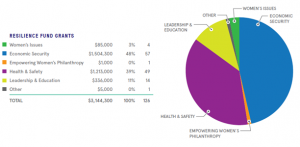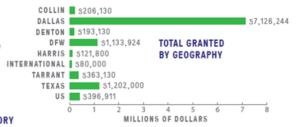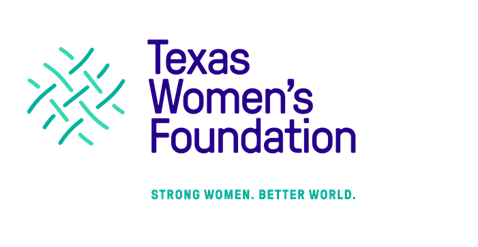The Dallas-based organization, the world’s largest regional funder benefiting women, distributed 416 grants to shore up community programs addressing pandemic relief, economic security, and gender and race equity
DALLAS, September 2, 2021 – Texas Women’s Foundation continues to lead in advancing social and economic change for women and girls in Texas during a tumultuous year. During the organization’s fiscal year (July 1, 2020-June 30, 2021), the Foundation invested $12.9 in advancing its mission through research, advocacy, innovative programs and solutions, and grantmaking.
- Texas Women’s Foundation awarded a total of 416 grants totaling $10.8 million to organizations serving women and girls. (See charts below for distribution of granting by geography, issue area and total granted.)
- Texas Women’s Foundation also stepped up to the needs of the community in response to COVID-19 and the 2021 winter storm, much of it through the organization’s Resilience Fund, initially established in response to the pandemic. Of the $10.8 million distributed, TXWF granted $3.1 million from April 2020–June 30, 2021 in response to a range of community emergencies, while maintaining a continued focus on the intersection of gender and race and the disproportionate impact on women of color.
- $2.1 million was invested in programs that advance its mission and commitment to building stronger, more equitable communities where women and girls are full participants.
According to Roslyn Dawson Thompson, Texas Women’s Foundation president and chief executive officer, “We made significant investments through grants that supported the immediate needs of women, girls and their families to address the impact of COVID-19, as well as those that would have a longer-term impact on their lives and the community.”
Resilience Grants Supported Innovation
Access to healthcare is a challenge to women and girls from historically under-resourced communities, and COVID-19 produced additional barriers that TXWF sought to alleviate through the Resilience Fund. One example is a grant supporting an innovative approach for patients of Los Barrios Unidos Community Clinic. The clinic’s lead obstetrician, along with UT Southwestern Medical Center and FIGO (International Federation of Gynecology and Obstetrics), developed a replicable COVID-safe practice model and template of care that has already gained attention in the industry. The model uses both telehealth and onsite visits with obstetrical staff. The patient response has been positive and no-show rates have decreased.
Resilience Fund: Taking a Mid- to Long-term View
Another Resilience Fund grant increased economic security for women and their families by providing access to a financial institution and access to loans that were not available to them through traditional banking services. A grant to Dallas Area Interfaith Sponsoring Committee supported an alternative banking solution for those without government identification, in partnership with Resource One Credit Union.
COVID-19 increased food insecurity, and a TXWF Resilience Fund grant addressed the immediate need for food for elderly women by expanding a nonprofit’s capacity to reach them when their volunteer force was isolated for their health and safety. The grant supported implementation of a paperless meal delivery system that saved both money and staff time, allowing Meals on Wheels Collin County to serve more clients long-term and even save lives. The system immediately facilitated the day-to-day delivery of meals and decreased the response time for situations identified as safety and/or medical emergencies, especially for homebound and elderly women.
Resilience Grants Supported Nonprofits Working in Historically Marginalized Communities
Texas Women’s Foundation acknowledges the deep commitments that its grantee partners have to the communities they serve. Dawson Thompson added, “We trust that organizations with established community presence and cultural competence are best able to immediately recognize and respond to community needs, especially in times of crisis. Resilience Fund grantees, such as Muslim Community Center for Human Services, Southern Dallas Link and SER Jobs for Progress National, Inc., all share a history of responding to the needs of the unique communities they serve.”
Muslim Community Center for Human Services in Tarrant County teaches employability skills to aid entry of refugee/immigrant/low-income women, primarily survivors of domestic and/or sexual violence, into the workforce. Southern Dallas Link enables single-female headed households of South Dallas to maintain employment and resources by providing safe, dependable transportation. SER Jobs for Progress National, Inc. provided necessities for the Early Head Start families in Grand Prairie and Senior Community Service Employment Program participants in Fort Worth, and supported emergency needs during and after winter storm Uri.
Resilience Grants Supported Organizations Led by Women of Color
A fundamental aspect of TXWF’s work is to support women’s leadership in all sectors. During this past year and a half, organizations led by women of color were at the forefront of addressing the unique needs of their communities, and particularly women of color who were disproportionately impacted by COVID-19.



